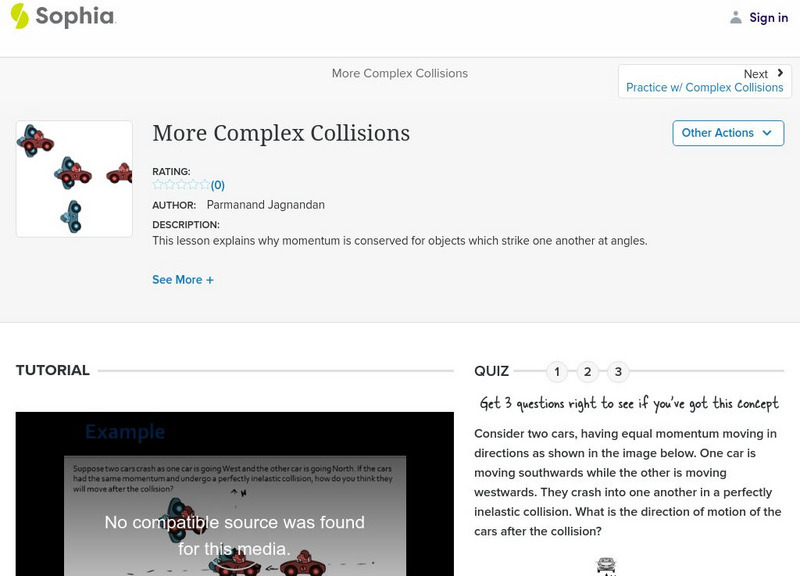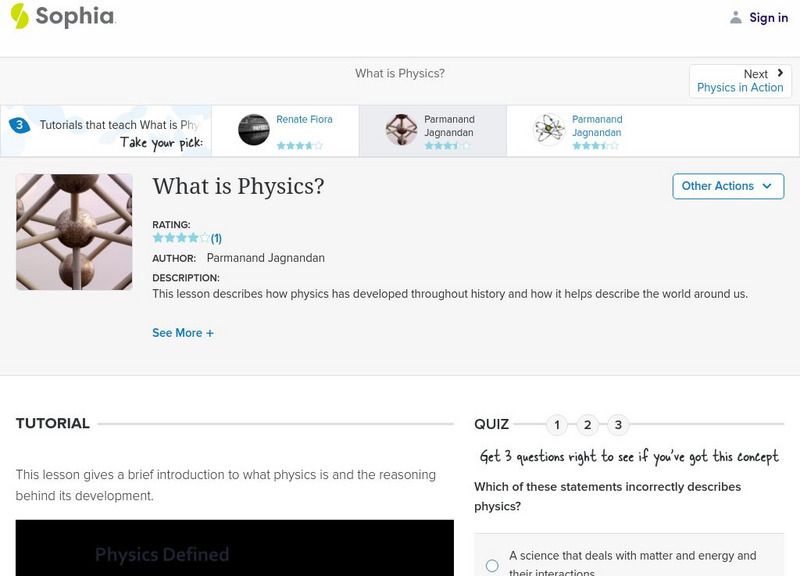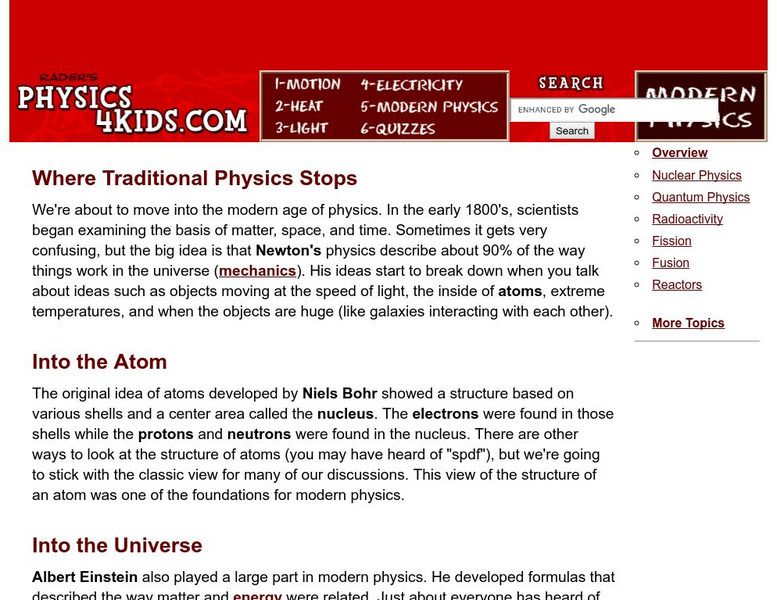Sophia Learning
Sophia: More Complex Collisions
This lesson explains why momentum is conserved for objects which strike one another at angles.
Sophia Learning
Sophia: Physics in Action: Lesson 4
This lesson describes how physics gets used in different fields. It is 4 of 4 in the series titled "Physics in Action."
Sophia Learning
Sophia: What Is Physics?: Lesson 3
This lesson describes how physics has developed throughout history and how it helps describe the world around us. It is 3 of 6 in the series titled "What is Physics?"
Sophia Learning
Sophia: What Is Physics?: Lesson 6
This lesson describes how physics has developed throughout history and how it helps describe the world around us. It is 6 of 6 in the series titled "What is Physics?"
Physics4kids
Physics 4 Kids: Where Traditional Physics Stops
We're about to move into the modern age of physics. In the early 1800's, scientists began examining the basis of matter, space, and time. Sometimes it gets very confusing, but the big idea is that Newton's physics describe about 90% of...
Sophia Learning
Sophia: Doppler Effect: Lesson 1
This lesson will describe how the doppler effect is created by moving sound waves. It is 1 of 4 in the series titled "Doppler Effect."
Sophia Learning
Sophia: Fission and Fusion: Lesson 3
This lesson will explain how fission and fusion in chemical reactions can be used to produce energy. It is 3 of 4 in the series titled "Fission and Fusion."
Sophia Learning
Sophia: Free Body Diagram: Lesson 2
This lesson introduces the concept of the free-body diagram. It is 2 of 2 in the series titled "Free-Body Diagram."
Ducksters
Ducksters: Practice Science Questions: Basic Physics
Answer some basic physics questions with this quiz.
Ducksters
Ducksters: Practice Science Answers: Basic Physics
Find the answers to the basic physics quiz on this website.
Ducksters
Ducksters: Physics for Kids: Energy
Kids learn about the science behind Energy including its different forms such as chemical, electrical, heat, and gravitational. When is energy considered renewable or nonrenewable?
Ducksters
Ducksters: Physics for Kids: Electrical Conductors and Insulators
Kids learn about electrical conductors and insulators in the science of electricity and physics including materials, superconductors, and semiconductors.
Ducksters
Ducksters: Physics for Kids: Kinetic Energy
Kids learn about kinetic energy in the science of physics. The energy of motion can be calculated using mass and velocity. The standard unit is the joule. How it is different from potential energy.
Ducksters
Ducksters: Physics for Kids: Lenses and Light
Kids learn about lenses and light in the science of physics including concave, convex, converging, diverging, focal point, meniscus, and Plano lenses.
Ducksters
Ducksters: Physics for Kids: Behavior of Light as a Wave
Kids learn about the behavior of light as a wave in the science of physics including reflection, refraction, and diffraction.
Ducksters
Ducksters: Physics for Kids: Mass and Weight
Kids learn about mass and weight in the science of physics and the laws of motion including units and measurement. What is the difference between mass and weight?
Ducksters
Ducksters: Physics for Kids: Momentum and Collisions
Kids learn about momentum and collisions in the science of physics and the laws of motion including units and measurement. Calculate momentum using mass times velocity.
Ducksters
Ducksters: Physics for Kids: Ohm's Law
Kids learn about Ohm's law in the science of electricity and physics including current, resistance, voltage, example problems, and V=IR.
Ducksters
Ducksters: Physics for Kids: Photons and Light
Kids learn about photons in the science of physics, the particles of energy that make up light including properties and how they interact with matter.
Ducksters
Ducksters: Physics for Kids: Potential Energy
Kids learn about potential energy in the science of physics. The energy of position and state can be calculated using mass, gravity, and height. The standard unit is the joule. How it is different from kinetic energy.
Ducksters
Ducksters: Physics for Kids: Power
Kids learn about power in the science of physics and the laws of motion including units and measurement in watts. Calculate power using work divided by time.
Ducksters
Ducksters: Physics for Kids: Pressure
Kids learn about pressure in the science of physics and the laws of motion including units and measurement in pascals. Calculate pressure using force divided by area.
Ducksters
Ducksters: Physics for Kids: Resistors, Capacitors, and Inductors
Kids learn about resistors, capacitors, and inductors in the science of electronics and physics including measurement, symbols, and standard units.
Ducksters
Ducksters: Physics for Kids: Scalars and Vectors
Kids learn about scalars and vectors in the science of physics. Scalars are magnitude only while vectors have magnitude and direction. Examples and differences and how to draw a vector.

























